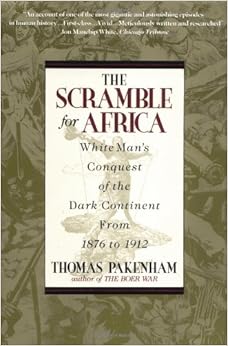I am about half way through reading The Scramble for Africa: White Man's Conquest of the Dark Continent from 1876 to 1912 by Thomas Pakenham. I am finding it really useful. It fills a gaping hole in my knowledge of Africa and also a hole in my recent readings on World War I.
We tend to think of North Africa as part of the Mediterranean lands. With the construction of the Suez Canal, making access to the rich colonies of the European imperial powers easier, Egypt became an important strategic area for those powers. England and France used their growing economic power to bring Egypt under their influence.
While Europeans had sailed around the coast of Africa for centuries, and established coastal trading posts and posts to supply ships sailing around the continent, most of the center of Africa remained unknown to Europe and thus uncolonized. In the late 19th century, however, the interest in Africa was raised by European explorers and missionaries, and by the anti-slavery movement.
I recently read The Sultan's Shadow: One Family's Rule at the Crossroads of East and West by Christiane Bird. (See the relevant post in this blog.) It deals primarily with the Arab control of part of East Africa before and during the early years of the scramble. I am also familiar with King Leopold's Ghost: A Story of Greed, Terror, and Heroism in Colonial Africa by Adam Hochschild. I have also worked for a few months in Egypt and in Uganda, and visited Morocco, Senegal and Ghana. I have also read a little about the countries that were formed from former British colonies of Africa (in conjunction with consulting work for the Carnegie Corporation of New York). However, I did not know much if anything about the 19th century scramble for Africa.
Europeans began to be interested the three “Cs” of African colonialism—the civilizing mission, commerce, and Christianity-- as they learned more about the continent, the dreadful toll that slavery was taking of African peoples, and the potential riches in the interior of Africa that could be acquired. Suddenly, the European colonial powers divided the continent among themselves. Author Pakenham describes the antecedents of the scramble and the process itself. He puts the European interests in perspective of their global concerns as well as domestic politics. He also tells some great stories!

1 comment:
Thomas Pakenham, in the chapter about the horrors of King Leopold's Congo, mentions that England and France signed the Entente Cordiale as part of a deal giving France Morocco and England a free hand in Egypt. Germany was not pleased by this new alliance of France, England and Russia (as Russia was already allied with France). Thus the roots of World War I go back to the scramble for Africa by European imperial powers.
Post a Comment